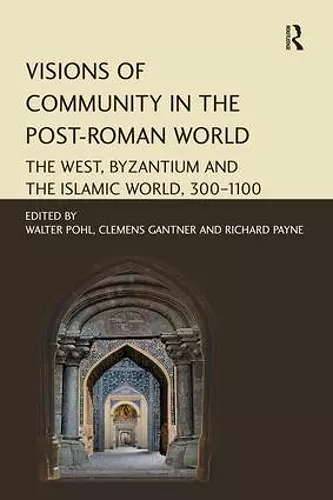Visions of Community in the Post-Roman World
The West, Byzantium and the Islamic World, 300–1100
Clemens Gantner author Richard Payne editor Walter Pohl editor Clemens Gantner editor
Format:Paperback
Publisher:Taylor & Francis Ltd
Published:28th Nov '16
Currently unavailable, and unfortunately no date known when it will be back
This paperback is available in another edition too:
- Hardback£150.00(9781409427094)

This volume looks at 'visions of community' in a comparative perspective, from Late Antiquity to the dawning of the age of crusades. It addresses the question of why and how distinctive new political cultures developed after the disintegration of the Roman World, and to what degree their differences had already emerged in the first post-Roman centuries. The Latin West, Orthodox Byzantium and its Slavic periphery, and the Islamic world each retained different parts of the Graeco-Roman heritage, while introducing new elements. For instance, ethnicity became a legitimizing element of rulership in the West, remained a structural element of the imperial periphery in Byzantium, and contributed to the inner dynamic of Islamic states without becoming a resource of political integration. Similarly, the political role of religion also differed between the emerging post-Roman worlds. It is surprising that little systematic research has been done in these fields so far. The 32 contributions to the volume explore this new line of research and look at different aspects of the process, with leading western Medievalists, Byzantinists and Islamicists covering a wide range of pertinent topics. At a closer look, some of the apparent differences between the West and the Islamic world seem less distinctive, and the inner variety of all post-Roman societies becomes more marked. At the same time, new variations in the discourse of community and the practice of power emerge. Anybody interested in the development of the post-Roman Mediterranean, but also in the relationship between the Islamic World and the West, will gain new insights from these studies on the political role of ethnicity and religion in the post-Roman Mediterranean.
'As a collection, the volume is a valuable introduction to the spectrum of identities operating at the end of antiquity. As such it moves the discussion of group identity and community solidarity beyond the internal debates that have preoccupied Western medievalists and thus may provide a prolegomena for future comparative studies of community in the post-Roman world.' Speculum, Patrick J. Geary, Institute for Advanced Study 'The value of the book [...] does not so much lie in an abstract (and perhaps uncontroversial) point about identity as a dynamic development with consequences for the exercise of power. The real argument, and the real excitement here, feature in the riot of examples that move across northern and eastern Europe, the Mediterranean, the Caucasus, Ethiopia, the Arabian peninsula, Mesopotamia, the Iranian plateau, and even into the Eurasian steppe - and through this sweep of societies whose boundaries shifted and overlapped continuously, it becomes clear how deeply the question of community mattered to the politics of Late Antiquity and the early Middle Ages... Even a review this long reproduces the problem of identity in miniature: it highlights certain unifying features of the collection while bypassing almost all its subtle details. It is that subtlety which brings us much closer to the worlds of Late Antiquity and the early Middle Ages: for all the identities that were drawn in these centuries, they were so often porous and heterogeneous that one reaches a point where (as Haldon and Kennedy stress) the concept of "society" itself seems to reach its limits. One of the pleasures of this volume is that it maintains a productive tension throughout between these two views, between the bounded and the unlimited - both equally vital to understanding the period.' The Medieval Review '... this is a kaleidoscopic book with an ambitious scope... The present volume is for those who seek varieties of approaches and perspectives through which they are bound t
ISBN: 9781138277212
Dimensions: unknown
Weight: 453g
592 pages